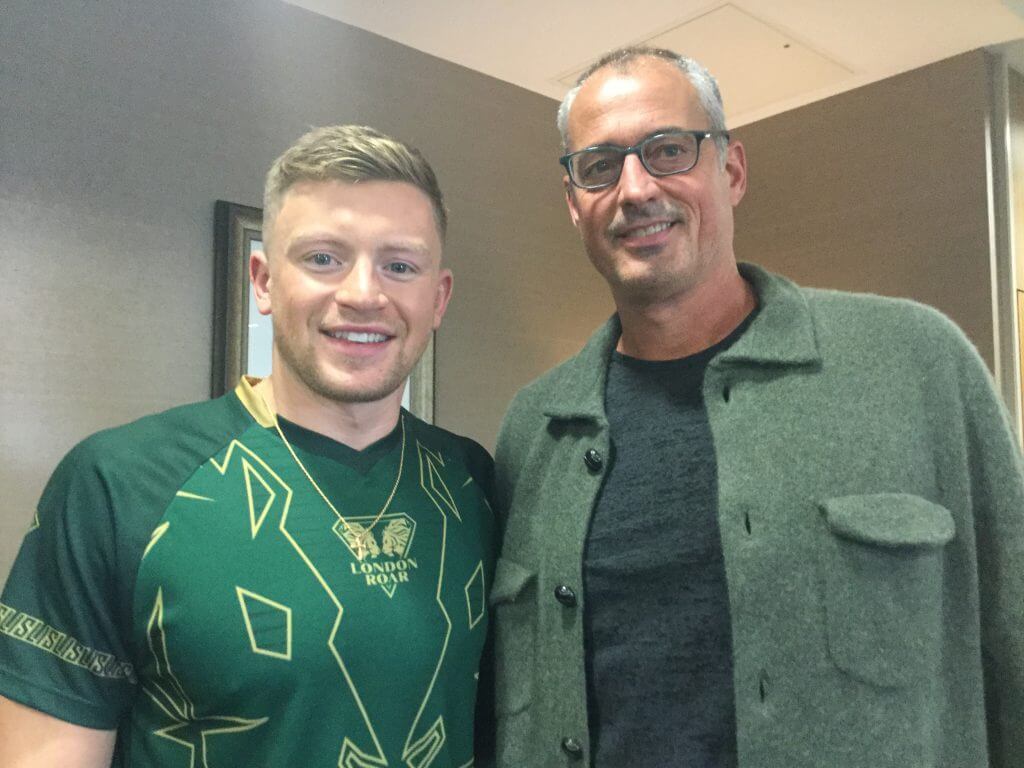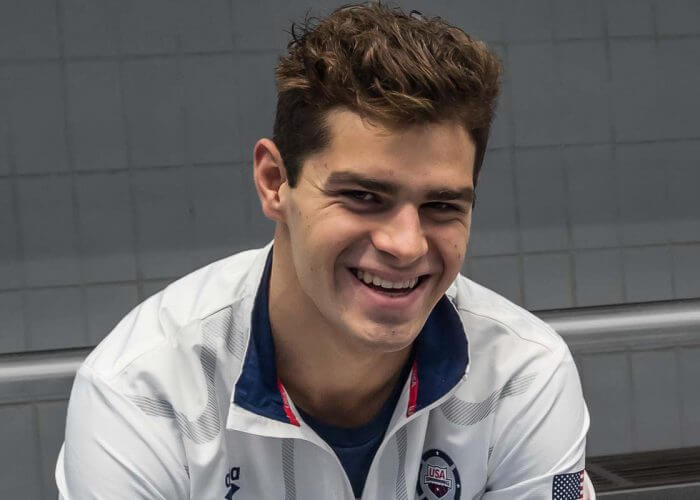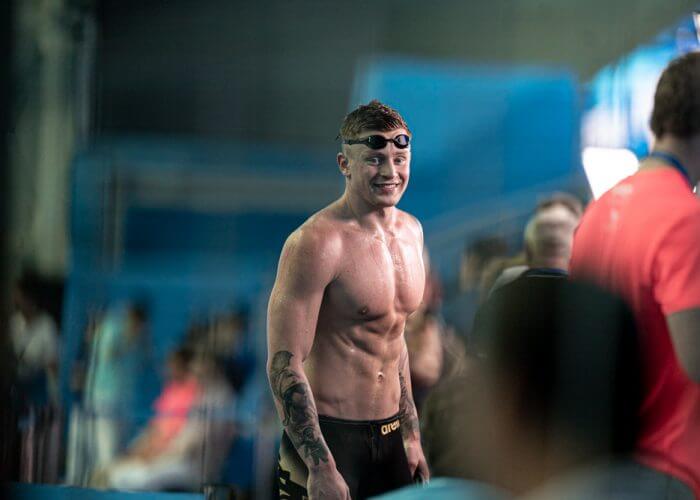Make Adam Peaty Your Mature Model Of The Athlete, Matt Biondi Urges Americans

Matt Biondi has cited Adam Peaty as “the more mature model of the athlete” that swimming needs as it enters a new professional era in which the director of the International Swimmers’ Alliance will ask Olympic bosses to cough up $2m in prizes for every final at the Games.
In our first look at The Athlete Voice in Swimming World’s 2020sVision series, Biondi laments that his fellow American swimmers’ “ability to understand all the many components that go into the Olympics” comes down to ” … wake up early, I go to the pool…, I do what my coach tells me to, I go home, I eat, I study, I sleep, I go back to the pool”. Swimming needed more athlete leaders like Peaty, he opined.
Asked about the stance made by Peaty, the reigning Olympic Champion for Britain over 100m breaststroke, on doping, rules, money, the right to choose when and where to race and other issues, Biondi, American winner of five golds atop seven medals at the 1988 Games in Seoul, told Swimming World:
“I think he fits into the more mature model of the athlete: he’s confident; he’s aware and you know, he’s just honest, right?! The politician couches it so that everyone is happy; it’s just so refreshing yo have someone like him take a side and call it like it is. We need people like that: he’s got a good head on his shoulders. He’s not just firing off.”
The breaststroke pace pioneer who nailed project 56 with a World record of 56.88 over 100m to retain the World title for a record second time last July, challenged the FINA leadership to “ban me if you dare” in 2018 when the international federation forced the cancellation of an International Swimming League (ISL) test event. Instead, Peaty and 30 others Olympic and World-Championship medallists gathered in London to back the ISL.
Since then, Peaty has been outspoken on doping, podium protests and issues that affect the welfare and rights of athletes.
“All this stuff will appeal to athletes depending on where they are on that spectrum or where they are in the lights of their career,” says Biondi.
At 25, Peaty is a man six years beyond his breakthrough season on his way to becoming one of the most outstanding specialists in swimming history. In an interview with Biondi, related in the opening article in our new 2020sVision series today, Biondi turns to the 27 matches planned for the second season of the ISL and says:
“I think the 27 matches will fit better with someone like Adam Peaty and, next year, Ryan Murphy and Nathan Adrian, Simone Manuel, Katie Ledecky, too, to some degree. Some of them may not want to train for the next Olympics because they will have been around a long time. So maybe get out on the road and see what you can do just heavy sprinting.”

Michael Andrew – Photo Courtesy: Peter H. Bick
Biondi cited Michael Andrew and his parents, Tina, manager of the New York Breakers, and Peter, his coach, as having “allowed coaches to rethink training. You want to train like you want to perform, right, so why am I swimming 10 400IMs when I don’t swim the IM. What’s the point?”
He felt swimmers had a learning curve ahead of them and cited his own country’s swimmers as being behind their European counterparts when it came to understanding their workplace, saying:
“I’ve had more success at the top level with the European swimmers than I have with the American swimmers and I think its just a part of the culture of the sport: athletes, so many of them, I would say, conservatively, three out of five, have no opinion at all. They just don’t know what to make of it.”
Biondi sees his job as educating swimmers and then representing their voice in talks with organisations such as the International Olympic Committee and FINA.
“What I say to them [athletes] is ‘listen, this is an opportunity: under this structure of the ISL, the non-binding agreement, the board of directors of the Alliance – six of them are swimmers – it has the potential to be a very democratic process. That’s what’s going to be created for the swimming members. Those that want to join know it’s a non-binding agreement; they can pull out any time.”
The Alliance has its first 50 members among some of the biggest names in the sport. Biondi’s message to that crew is clear. With a “collective voice, we think that it’s fair to pay prize money at the Olympics”. He adds:
“It’s [Olympic sport] a 7.5-billion-dollar industry. The IOC makes 10% right off the top, that’s $700 million. Even if the swimmers could negotiate 100 million that’s 2 million per event and 600,000 for a gold. That’s the level of financial contribution that swimmers are making to the Olympics. But the paradigm is that they get zero. It’s a perfect business model. What company expects their top employees to perform for free?”
Olympic swimmers: are they perceived as being paid less for what they contribute to the Olympics than the Gladiators of Rome did for the entertainment they provided? “Exactly…,” he replies before explaining what the Games of Magic, the mini-Olympics with an ISL-style model, is all about.

Adam Peaty. Photo Courtesy: Becca Wyant
Peaty, meanwhile, has expressed an interest in taking up a leadership role in representing athletes when his racing days are done. To some extent, he’s already doing the job, part-time. In November 2018 in an interview for The Sunday Times, Peaty challenged FINA to “ban me if you dare” because he would be racing at International Swimming League events in 2019.
The international federation’s leadership had sent warnings to national federations calling on them to halt a planned ISL test event in Italy. It reminded federations of rules that forbid interaction with non-affiliated bodies in the absence of permission.
Peaty, currently on Olympic preparation camp in Australia, called on FINA to listen directly to athletes and described himself as “very passionate about the need for swimming to change if it’s going to grow … There’s been no real change in the sport for 20 and more years. It’s time it happened.”
He criticised the failing FINA World Cup Series that “… no-one is watching and 90 percent of the world’s best athletes don’t turn up because there’s no prestige” and urged the federation to back the ISL. Not long after, FINA granted ISL permission to host its first series of events.
Then, in Gwangju at World titles, Peaty hit back at FINA’s “meaningless” imposition of an emergency Code of Conduct rule designed to gag swimmers and make them toe the line in the face of silent podium protests from teammate Duncan Scott and Australia’s Mack Horton over the presence of China’s Sun Yang.
The then 24-year-old Peaty said that FINA “had to understand” that it no longer had any power over athletes, who had “a right to freedom of speech”.
That looks set to be a contentious issue come July in Tokyo. This month, the International Olympic Committee issued a warning to athletes that “political” protests at the Tokyo 2020 Olympics would not be tolerated. Representative body Global Athlete responded by stating:
“Let’s be clear, the Olympic Movement has already politicized sport. To mention a few instances; in PyeongChang the IOC promoted a unified South and North Korean team; the IOC has an observer seat around the United Nations Assembly; the IOC President regularly meets with Heads of States; the Olympic Movement notion of sport autonomy is overshadowed by Heads of States also fulfilling roles as heads of National Olympic Committees and heads of IOC Commissions hold Ministerial positions. This ship has sailed; the IOC has already politicized sport.
“Under Article 10 of the Universal Declaration of Human Rights, freedom of expression is a fundamental human right and sport rules should not have the ability to limit that right.
“The IOC does not compensate, nor do they employ the athletes to attend the Games. In fact, the IOC requires athletes to sign away their rights to attend the Olympic Games. Athletes devote years of their lives to qualify for the Olympic Games. If athletes want to speak up – in which they respect others rights and freedoms detailed in the Universal Declaration of Human Rights – we should embrace their diverse opinions. Silencing athletes should never be tolerated and to threaten them with removal from the Olympic Games is another sign of the imbalance of power between sport leaders and athletes.”




Adam Peaty, his character being a swimmer give a lot to inspired swimmers around the world. He is so nice down to earth person. God Bless Adam Peaty